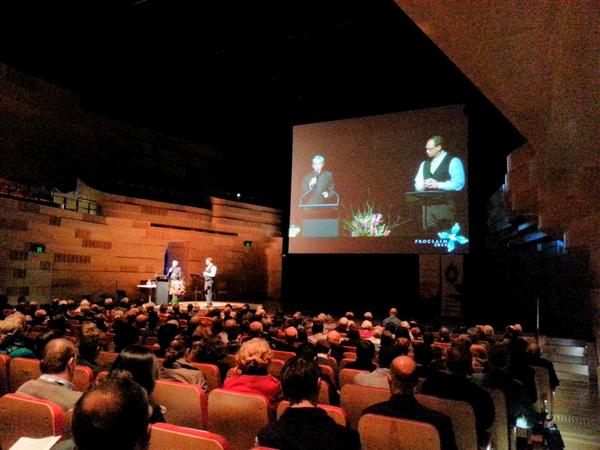In defending the traditional understanding of marriage, I’m acutely aware that I might come across as homophobic. That some people might think I’m intolerant or bigoted doesn’t bother me. That some people might be hurt or offended by my words bothers me a lot.
In my post on same-sex marriage one of my friends recalls Raimond Gaita’s analysis of bigotry. Gaita astutely observes that although bigotry is popularly associated with hatred, hatred is not necessary. For example, a racist needn’t hate people of other races — he can deny the common humanity of other races with the best will in the world.
In the same way, we can easily imagine a homophobe who does not hate or fear gay people, but who is nonetheless blind to, and denies, their common humanity.
Now I am utterly convinced that one can defend traditional marriage without denying one’s common humanity with men who want to marry men and women who want to marry women. But I’m also conscious that many of those men and women feel besieged and even persecuted by their adversaries in this debate. When the Church — the Mystical Body of Christ authorised to proclaim the Gospel — is seen to be such an adversary, we have a problem.
I tend to see good and devout Catholics — myself included — as the modern-day counterpart to the Pharisees. (Bear in mind, the Pharisees weren’t all bad. Nicodemus assisted with the burial of Jesus. And Paul becomes the greatest evangelist in Church history.)
It’s no coincidence, I think, that our Lord so strongly condemned the Pharisees. In the first place, as good and devout Jews, they should have been his natural constituents, but their hearts were hardened. But in the second place, our Lord must have intuited that in centuries to come, his most devoted followers would be prey to the same Pharisaical spirit.
The Lord has given the Church — and by that I mean us —the authority to proclaim his saving Word. This is an authority we dare not abuse in the way the Pharisees abused theirs.
The word “authority” becomes from the Latin augere — “to grow.” Authority is often used for the honour and privilege of those who exercise it. But this is an abuse. Authority is intended to help other people grow.
We’ve seen how our Lord exercised his authority in his treatment of the woman caught in adultery. While the Pharisees figuratively towered over the accused from the moral heights, he literally stooped down to the ground. From this position of vulnerability, he addressed the powerful: the accusing crowd.
They had separated themselves from the woman. They had exercised their authority in way that heightened their own dignity but which diminished the accused. They had isolated her. In contrast to that, Jesus points out what they all have in common: “Let the one who is without sin cast the first stone.”
As the Pharisees move off, Jesus remains bent over. The accused woman is still vulnerable. So he keeps his position, which is more vulnerable still. It’s only when he is alone with the woman that he straightens up and meets her face to face.
I think in the washing of the feet, Jesus taught his disciples do the same. And by that, I mean he taught his apostles and you and me. This is what I was thinking tonight, while I washed the feet of parishioners.
As Jean Vanier observed, our Lord is asking us to exercise our authority “from below.” Like the authority a child has over a mother, or a friend over a friend. To exercise authority in a way which leaves us vulnerable to others. Open to them.
I’m not suggesting that the Church is pharisaical in its defence of marriage. I totally reject the suggestion that it’s pharisaical to condemn sinful behaviour. But we all know it’s a very fine line between condemning the sin, and condemning the sinner. And when we’re in the business of evangelising (which we are), perception is as important as intention.
We must remember the washing of the disciples’ feet whenever we engage in the cultural battles of our time. That’s not easy when we face off militant opponents, be they atheists or feminists or queer theorists. It’s natural to fight fire with fire. Nonetheless, Jesus asks us to meet the vulnerable (for they are vulnerable) by assuming a position which is even more vulnerable. And to greet them on equal terms only after we have built them up.
The authority Christ gives us should help others to grow.






I think this is a wonderful post, Father John. I think you have nailed the underlying (or overarching) issue in, not just the questions of same-sex marriage etc but also, the problem of discourse on religious and moral truth: the very real challenge and problem and mystery of what ‘Christian’ love is for Christians. The saying ‘hate the sin, not the sinner’ is easy to roll off the tongue, and frequently is, but the mess most of us make of the reality gives the lie to it and us.
Not that it does not offer us a worthwhile goal, or does not show us the way (in everything), but we ought not to deceive ourselves that its accomplishment is often like water in the desert.
Even the gap between our intellectual grasp of things (if this is sound) and our actual record of living will be a reproach for most of us most of the time. I sense that Jesus’ message was to point out the dangers of self-satisfaction into which we can fall the instant we think we have discovered the truth; in short, to reject all vanities, all idolatries, of which the most insidious is ourselves. It was God who was to be the sole object of our love, and the love of our neighbour “as ourselves” (in the best sense) that was to be a test of it.
How and what we must do to love God becomes then – almost in direct disregard of Jesus’ warnings – the subject of furious dispute. Clearly, we must use our reason and communicate our ideas and how we feel, but in the end, the love which Jesus urged and which the Gospels often enigmatically present, is not an intellectual exercise, is it? There is something of a paradox in the religious life: Christian love may be a collateral victim in our pursuit of truth, yet it may not be possible at all without a love for the truth.
Of course, love and truth and justice and other things are aspects of a whole and in their true and ideal essence would not seem to be able to be opposed to each other but we often act as if they are.
I don’t know the answers to a lot of these questions, but I recognise a sensitive, thoughtful, and coherent approach when I come across it, and I think yours is such. (And appropriate for Good Friday.) Well said, Father John.
A beautiful reflection. Thank you : )
Indeed a great post, Fr John.
I’d like to tell a story here on the subject of homosexuality. Some years ago my new neighbour told me he hoped I wouldn’t be disturbed by the noise of him having sex. I lowered my brow, put on a stern voice, and said, “Barry, I never want to hear that.”
I never did. He was a model neighbour.
The day he moved out he came down for a coffee and during the conversation he informed me that the gay community was treacherous and cruel. I told him about an article I read about the Catholic Doctors’ Association of the USA who speculated that homosexuality might be caused by the baby boy failing to “ingest” his father, an essential for masculinity. So the grown boy goes looking for Dad in all the wrong places – and of course ends up addicted and a slave to lust.
He was fascinated by this theory and wanted to switch to drinking beer and carry on the conversation. I couldn’t, but gave him a hug and wished him well.
I would say we could have this conversation for only one reason: I loved him and wanted him to lead a happy life, not a miserable addicted one which put his mortal soul in danger.
I’ve had subsequent gay neighbours and try and lavish affection on them. Love of Christ for these young men mediated through us is the only thing which enables us to liberate them (or begin the process) from hell.
One more thing. These guys are nailed to the Cross, unable to marry and have children. They deserve our respect.
Pope Francis at mass of Chrism said that shepherd must have odour o f the sheep rather than be separate from them. He must. Be amongst them to get the odour. But some sheep …
“The word “authority” becomes from the Latin augere — “to grow.” Authority is often used for the honour and privilege of those who exercise it. But this is an abuse. Authority is intended to help other people grow.”
Where did you read that? I checked, but it seems it aint so…
http://www.etymonline.com/index.php?allowed_in_frame=0&search=authority&searchmode=none
No, No, no, Dan, with all respect. Father John is right. To understand the derivation you must look to the supine of the relevant root verb and classical usages of the nouns. “Auctoritas” is the quality (origination) of the “auctor” (progenitor, originator); “auctor” was used to mean father, and then builder, founder. The verb “augeo” (increase, grow, spread, extend, enlarge) has its supine “auctus” and the nouns take that form. Thus we have the words “augment” (to build, enlarge etc) and “author” (the originator).
Now, does this mean that to exercise authority is to “make grow”? Well, here is an example where we confront the modern usage and the original intent of the words. In modern parlance, to exercise authority means to “flex one’s muscle”, “use power”, “enforce” and other nuances implying restriction. But what Father John is saying, I believe, is that authority is best understood as “the power to make grow” and not the power to confine.
Of course, there is a sense in which the power to “confine” or “protect” can result in “growth” – when a parent restricts his or her children from harm, then it is in the cause of growth. But the key concept in all of this is, does the person who is the object of an exercise of authority actually grow? Is their growth the object of the exercise? Too often, authority is conceived of as power and right and entitlement, and not the obligation to serve and foster and promote.
In some cases, it may not even be a case of simply claiming that the exercise of authority has as its object the growth of the subject, as if the mere intention was always sufficient to give full effect and legitimacy to the act. This is where respect for where people are at, mentally, spiritually, in their circumstances, must kick in. There will be cases where the best thing to do might not be the most right thing to do: hence, authority cannot be approached as a blunt instrument….or at least mostly. There will always be special pleadings or circumstances or things to take into account before crashing in. Hence, authority is affirming service and best seen as such.
To get back to the language question: one of William Byrd’s motets begins: “memento salutis auctor….”. Be mindful, O author of salvation (i.e. he from whom salvation comes, results). Yes, the concept of growth is important here.